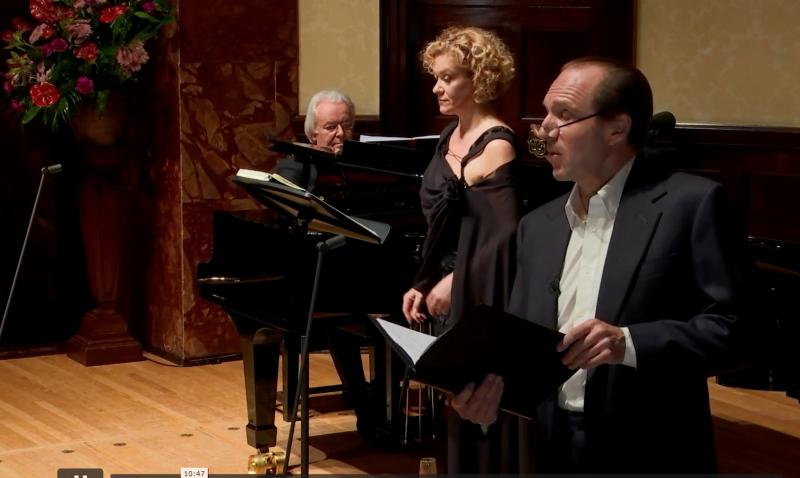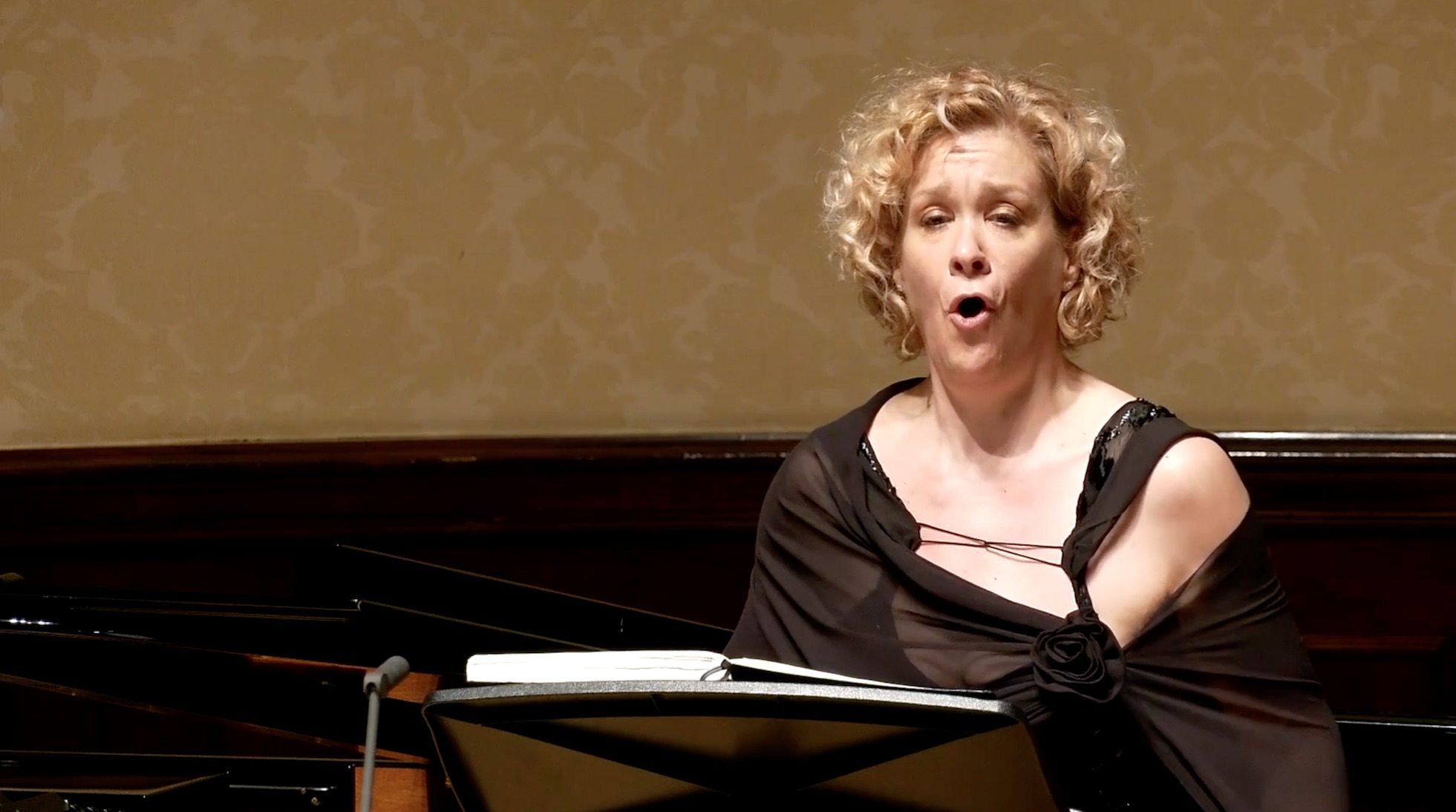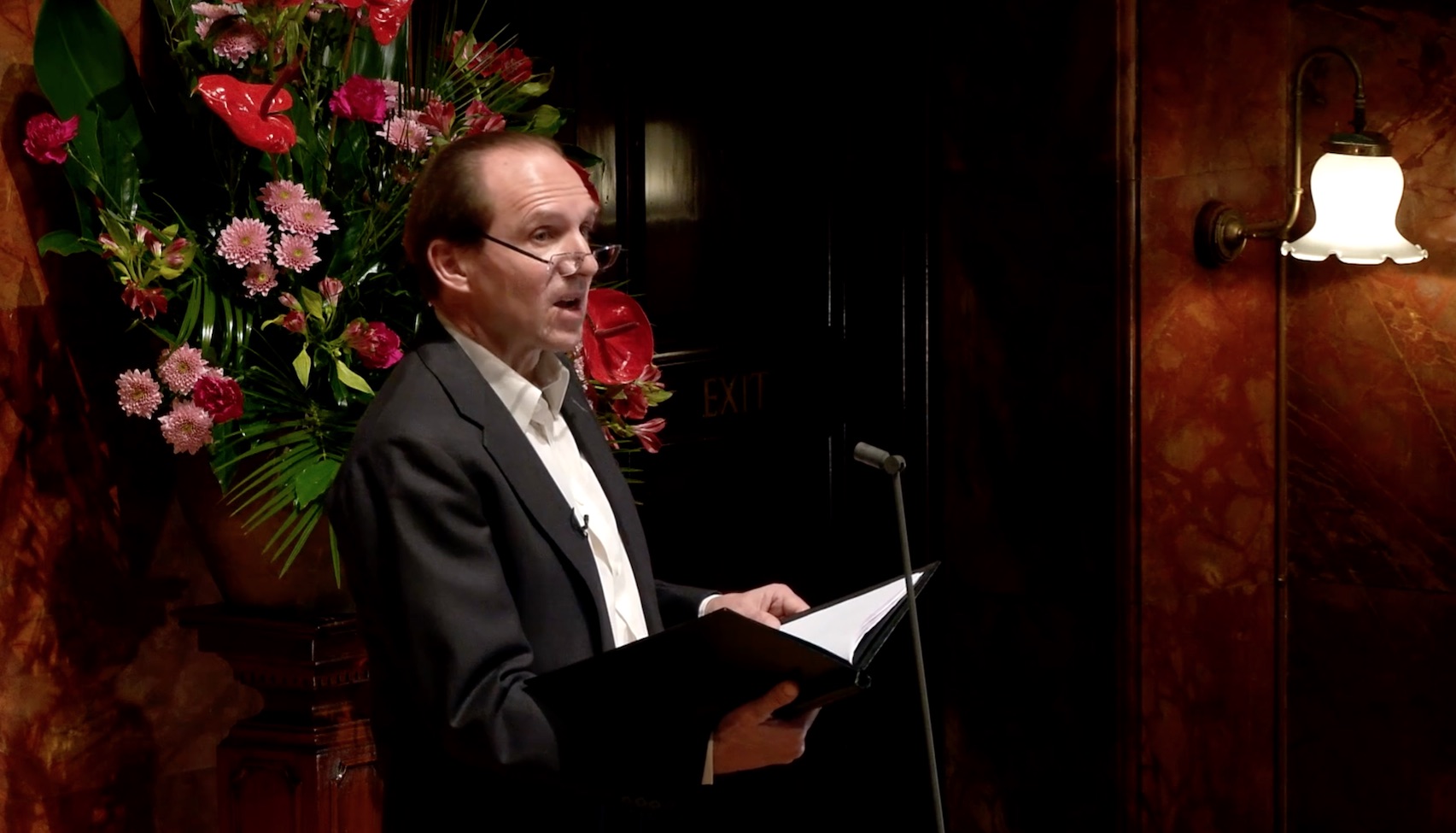Coote, Blackshaw, Fiennes, Wigmore Hall online review – lonely hearts club band | reviews, news & interviews
Coote, Blackshaw, Fiennes, Wigmore Hall online review – lonely hearts club band
Coote, Blackshaw, Fiennes, Wigmore Hall online review – lonely hearts club band
Tchaikovsky songs and Russian poems harmonise in a melancholy magic

Why, in Lieder singing above all, should an outpouring of deep feeling so frighten critics? Alice Coote’s unabashed emotionalism as a recitalist can sometimes bring out the worst in the stiff-upper-lip brigade, as reactions to her high-impact Winterreise (last given at the Wigmore prior to the current lockdown) revealed.
Christian Blackshaw accompanied, which meant luxury casting all round. It made for a drama-packed, as well as a star-spangled, 80 minutes. Coote (pictured below) took a dozen songs (sung in her finely articulated Russian) from the different volumes of “romances” that Tchaikovsky composed throughout his career. They came enriched not only by eight poems delivered by Fiennes, but by four selections from Tchaikovsky’s letters. Together, the items built into a kind of portrait of the musical artist as an anguished, yearning soul, in thrall to both unrequited love and restless creativity, with the poems as a choric commentary on themes embedded in the songs. The event’s title, Tchaikovsky and his Poets, did perhaps sow a little confusion. Some of the songs set other lyrics by the poets Fiennes read (Pushkin, Lermontov and Afanasy Fet) but most did not. For instance, the reliably show-stealing “None but the Lonely Heart” (which, by the way, none but Frank Sinatra absolutely nailed in his late-1940s heyday) comes from verse by Goethe.
 It goes without saying (or it should) that Coote’s mezzo is an all-terrain vehicle of awesome powers. It scaled every peak and trough of feeling on Tchaikovsky’s map of longing, regret and desolation with accomplished ease. In the absence of a physical audience in the Wigmore, she hugged the virtual public close, enlisting a spectrum of gestures and a generous dynamic range to conjure the intimacy that our performing circumstances still forbid. Though often wistful, mournful and unbearably tender, Tchaikovsky’s writing for the voice seldom goes in for outright melodrama. And Coote’s passages of subdued yearning and weary resignation, in “Do not believe, my friend” or “Not a word, my friend”, proved just as affecting as the relentless snowball of anguish in “Why?” or the fortissimo climax of “Love of a dead man”.
It goes without saying (or it should) that Coote’s mezzo is an all-terrain vehicle of awesome powers. It scaled every peak and trough of feeling on Tchaikovsky’s map of longing, regret and desolation with accomplished ease. In the absence of a physical audience in the Wigmore, she hugged the virtual public close, enlisting a spectrum of gestures and a generous dynamic range to conjure the intimacy that our performing circumstances still forbid. Though often wistful, mournful and unbearably tender, Tchaikovsky’s writing for the voice seldom goes in for outright melodrama. And Coote’s passages of subdued yearning and weary resignation, in “Do not believe, my friend” or “Not a word, my friend”, proved just as affecting as the relentless snowball of anguish in “Why?” or the fortissimo climax of “Love of a dead man”.
Phrase by phrase, line by line, these were strongly shaped performances that recruited Coote’s prowess and control across her range to refine the emotional palette of the songs, rather than just overwhelm them. Many of the pieces, such as the gorgeous “The mild stars shone for us”, trace an aria-like curve of feeling. Coote knew how to plot each point along it with quietly reflective as well as splashily declamatory moments. Oddly, it was in “None but the lonely heart” itself that her phrasing and intonation once or twice sounded mannered and over-emphatic (Frank, of course, stays heart-breakingly cool). Amid the love-lorn solitude and abandonment, there was however scope in this selection for a few spells of a sunnier lyricism. In a piece such as “I bless you, forests”, Coote made them properly shine.
 The rippling, sparkling piano part to that song gave Christian Blackshaw a conspicuous opportunity to dazzle in his supremely tasteful way. Throughout, he sprinkled the accompaniment with touches of grace that avoided any sense of doomy portentousness: the passions here need no clumsy underlining. Across the stage, Ralph Fiennes punctuated the music with five iconic Pushkin lyrics, in addition to poems by Lermontov and Fet. The four chosen letters broadly traced the outlines of Tchaikovsky’s famously tortured inner life: his suppressed same-sex longings; his catastrophic, loveless marriage; his crippling self-doubt and morbid depression, allied to “an awful desire to compose”. Sometimes urbane, sometimes stricken, and never actorly in an obtrusive way, Fiennes (pictured above) made a sensitive, congenial third member of the impromptu trio. He spoke his Pushkin pieces with a particular relaxed authority. However, I had serious doubts about the stage Mockney he employed for the accent of the philistine masses who tease the bard in “The Poet and the Crowd”. These days, the voice of the sneering, bone-headed bigot who demands of true artists “Where’s the gain?” should surely belong to an offshore media billionaire – or, better, an Eton-schooled government minister.
The rippling, sparkling piano part to that song gave Christian Blackshaw a conspicuous opportunity to dazzle in his supremely tasteful way. Throughout, he sprinkled the accompaniment with touches of grace that avoided any sense of doomy portentousness: the passions here need no clumsy underlining. Across the stage, Ralph Fiennes punctuated the music with five iconic Pushkin lyrics, in addition to poems by Lermontov and Fet. The four chosen letters broadly traced the outlines of Tchaikovsky’s famously tortured inner life: his suppressed same-sex longings; his catastrophic, loveless marriage; his crippling self-doubt and morbid depression, allied to “an awful desire to compose”. Sometimes urbane, sometimes stricken, and never actorly in an obtrusive way, Fiennes (pictured above) made a sensitive, congenial third member of the impromptu trio. He spoke his Pushkin pieces with a particular relaxed authority. However, I had serious doubts about the stage Mockney he employed for the accent of the philistine masses who tease the bard in “The Poet and the Crowd”. These days, the voice of the sneering, bone-headed bigot who demands of true artists “Where’s the gain?” should surely belong to an offshore media billionaire – or, better, an Eton-schooled government minister.
- The Wigmore's stream of this concert is now available on the Hall's website on demand
- Read more classical music reviews on theartsdesk
rating
Share this article
Add comment
The future of Arts Journalism
You can stop theartsdesk.com closing!
We urgently need financing to survive. Our fundraising drive has thus far raised £49,000 but we need to reach £100,000 or we will be forced to close. Please contribute here: https://gofund.me/c3f6033d
And if you can forward this information to anyone who might assist, we’d be grateful.

Subscribe to theartsdesk.com
Thank you for continuing to read our work on theartsdesk.com. For unlimited access to every article in its entirety, including our archive of more than 15,000 pieces, we're asking for £5 per month or £40 per year. We feel it's a very good deal, and hope you do too.
To take a subscription now simply click here.
And if you're looking for that extra gift for a friend or family member, why not treat them to a theartsdesk.com gift subscription?
more Classical music
 Goldscheider, Brother Tree Sound, Kings Place review - music of hope from a young composer
Unusual combination of horn, strings and electronics makes for some intriguing listening
Goldscheider, Brother Tree Sound, Kings Place review - music of hope from a young composer
Unusual combination of horn, strings and electronics makes for some intriguing listening
 theartsdesk Q&A: composer Donghoon Shin on his new concerto for pianist Seong-Jin Cho
Classical music makes its debut at London's K-Music Festival
theartsdesk Q&A: composer Donghoon Shin on his new concerto for pianist Seong-Jin Cho
Classical music makes its debut at London's K-Music Festival
 Helleur-Simcock, Hallé, Wong, Bridgewater Hall, Manchester review - moving lyricism in Elgar’s concerto
Season opener brings lyrical beauty, crisp confidence and a proper Romantic wallow
Helleur-Simcock, Hallé, Wong, Bridgewater Hall, Manchester review - moving lyricism in Elgar’s concerto
Season opener brings lyrical beauty, crisp confidence and a proper Romantic wallow
 Kohout, Spence, Braun, Manchester Camerata, Huth, RNCM, Manchester review - joy, insight, imagination and unanimity
Celebration of the past with stars of the future at the Royal Northern College
Kohout, Spence, Braun, Manchester Camerata, Huth, RNCM, Manchester review - joy, insight, imagination and unanimity
Celebration of the past with stars of the future at the Royal Northern College
 Jansen, LSO, Pappano, Barbican review - profound and bracing emotional workouts
Great soloist, conductor and orchestra take Britten and Shostakovich to the edge
Jansen, LSO, Pappano, Barbican review - profound and bracing emotional workouts
Great soloist, conductor and orchestra take Britten and Shostakovich to the edge
 Jakub Hrůša and Friends in Concert, Royal Opera review - fleshcreep in two uneven halves
Bartók kept short, and a sprawling Dvořák choral ballad done as well as it could be
Jakub Hrůša and Friends in Concert, Royal Opera review - fleshcreep in two uneven halves
Bartók kept short, and a sprawling Dvořák choral ballad done as well as it could be
 Hadelich, BBC Philharmonic, Storgårds, Bridgewater Hall, Manchester review - youth, fate and pain
Prokofiev in the hands of a fine violinist has surely never sounded better
Hadelich, BBC Philharmonic, Storgårds, Bridgewater Hall, Manchester review - youth, fate and pain
Prokofiev in the hands of a fine violinist has surely never sounded better
 Monteverdi Choir, ORR, Heras-Casado, St Martin-in-the-Fields review - flames of joy and sorrow
First-rate soloists, choir and orchestra unite in a blazing Mozart Requiem
Monteverdi Choir, ORR, Heras-Casado, St Martin-in-the-Fields review - flames of joy and sorrow
First-rate soloists, choir and orchestra unite in a blazing Mozart Requiem
 Cho, LSO, Pappano, Barbican review - finely-focused stormy weather
Chameleonic Seong-Jin Cho is a match for the fine-tuning of the LSO’s Chief Conductor
Cho, LSO, Pappano, Barbican review - finely-focused stormy weather
Chameleonic Seong-Jin Cho is a match for the fine-tuning of the LSO’s Chief Conductor
 Classical CDs: Shrouds, silhouettes and superstition
Cello concertos, choral collections and a stunning tribute to a contemporary giant
Classical CDs: Shrouds, silhouettes and superstition
Cello concertos, choral collections and a stunning tribute to a contemporary giant
 Appl, Levickis, Wigmore Hall review - fun to the fore in cabaret and show songs
A relaxed evening of light-hearted fare, with the accordion offering unusual colours
Appl, Levickis, Wigmore Hall review - fun to the fore in cabaret and show songs
A relaxed evening of light-hearted fare, with the accordion offering unusual colours
 Lammermuir Festival 2025, Part 2 review - from the soaringly sublime to the zoologically ridiculous
Bigger than ever, and the quality remains astonishingly high
Lammermuir Festival 2025, Part 2 review - from the soaringly sublime to the zoologically ridiculous
Bigger than ever, and the quality remains astonishingly high

Comments
I really do wish that people
Not by any means all the time
Not by any means all the time, and he wrote some of the most joyous music ever, but there were undoubtedly times when he was 'morbidly depressed' - you only have to read his letters. Driven to attempt suicide over his disastrous marriage to cover up his homosexuality (if that's what you mean by 'thwarted in love'), and as for the end - jury's still out on that one. It doesn't do to cover up the depressive condition in creative artists any more than it needs to serve as a definition of who they were.